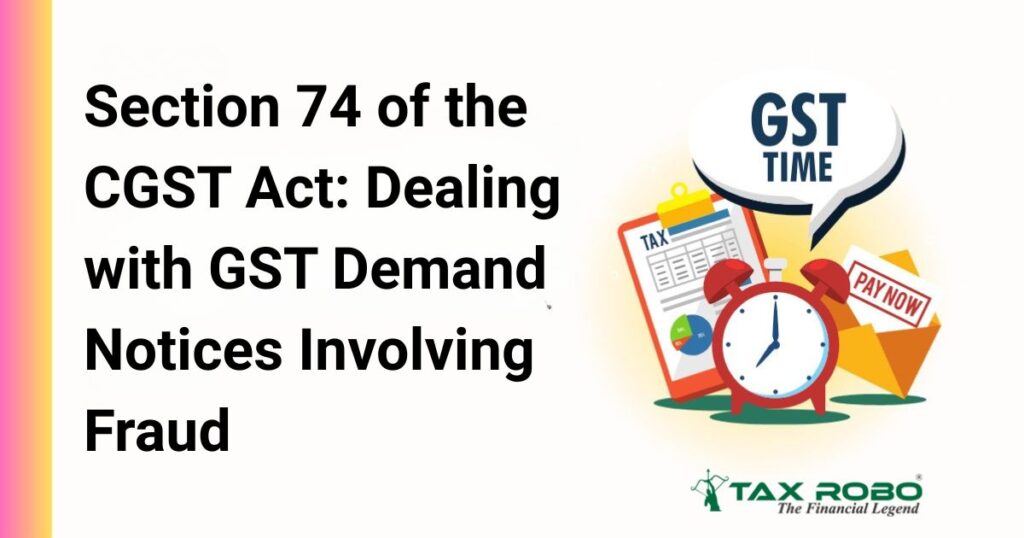Section 74 of the CGST Act: Dealing with GST Demand Notices Involving Fraud
Receiving any official communication from the tax department can cause anxiety. This feeling intensifies significantly when the notice is a GST demand notice, especially one hinting at fraud. In India’s Goods and Services Tax (GST) system, a robust framework governs tax collection and compliance for businesses and, in some cases, individuals. Understanding the specific rules is vital. One critical provision is Section 74 of the CGST Act. This section is invoked by tax authorities when they suspect that tax has not been paid, or has been short-paid, due to deliberate actions like fraud, willful misstatement, or suppression of facts with the intent to evade tax. Knowing the implications of this section is crucial for any taxpayer. This blog post aims to serve as a clear guide for understanding GST demands in India issued under Section 74, outlining the necessary steps for effectively dealing with GST demand notices related to alleged fraud. This information is particularly relevant for small business owners managing their own compliance, highlighting the importance of robust GST compliance for corporations in India and adaptable practices for smaller entities to avoid such serious allegations.
Understanding GST Demand Notices in India
Before diving deep into Section 74, it’s essential to grasp what a GST demand notice signifies within the broader context of tax administration. These notices are formal communications that alert taxpayers to potential discrepancies or liabilities identified by the tax authorities.
What is a GST Demand Notice?
A GST demand notice is a formal communication issued by the GST department when it believes there is a shortfall in tax payment, incorrect Input Tax Credit (ITC) claims, or other compliance failures. It essentially informs the taxpayer about the discrepancy found and the potential tax liability arising from it. The most common way the department initiates demand proceedings, particularly under Sections 73 and 74, is by issuing a Show Cause Notice (SCN). This SCN details the grounds on which the demand is being raised and asks the taxpayer to explain why the proposed tax, interest, and penalty should not be levied. Receiving an SCN is the starting point for the formal process of determining tax liability.
Why Do Taxpayers Receive GST Notices?
There are several common reasons why a taxpayer might receive a GST notice, often leading to a demand if discrepancies aren’t resolved. These triggers include:
- Mismatches between GSTR-1 and GSTR-3B: Differences between the outward supplies declared in GSTR-1 and the summary figures reported and paid via GSTR-3B.
- Mismatches between GSTR-2A/2B and GSTR-3B: Discrepancies between the Input Tax Credit available as per the auto-populated GSTR-2A/2B (based on supplier filings) and the ITC claimed by the taxpayer in GSTR-3B. This is a frequent area of scrutiny.
- Delays or Non-filing of GST Returns: Failure to file returns like GSTR-1, GSTR-3B, or the annual return (GSTR-9/9C) within the prescribed due dates.
- Discrepancies Found During Audits or Investigations: Departmental audits (under Section 65) or special audits (under Section 66) can unearth non-compliance issues leading to notices. Read more about the Primary Purpose of Internal Audit in the Modern Organization.
- Incorrect Tax Rate Application: Charging a lower GST rate than applicable on goods or services supplied.
- Wrongful Availment or Utilization of ITC: Claiming ITC on ineligible items, without proper documentation (like valid tax invoices), or in excess of eligible amounts.
- Erroneous Refunds: Claiming and receiving refunds based on incorrect information or calculations.
These triggers form the basis for understanding GST demands in India and highlight the importance of meticulous compliance.
Key Sections for GST Demand Notices (Brief Overview)
The CGST Act outlines several sections under which demand notices can be issued, depending on the nature and circumstances of the tax shortfall:
- Section 61 (Scrutiny of Returns): Allows officers to scrutinize returns and related particulars to verify correctness. If discrepancies are found, explanations are sought, potentially leading to further action under Section 73 or 74 if explanations are unsatisfactory.
- Section 73 (Determination of tax not paid or short paid or erroneously refunded or input tax credit wrongly availed or utilised for any reason other than fraud or any wilful-misstatement or suppression of facts): This section applies to genuine errors or omissions where there is no intent to evade tax. For more detailed guidance, visit Understanding Section 73 of the CGST Act: Handling GST Demand Notices Without Fraud. Penalties are lower, and the time limit for issuing the notice is shorter (generally 3 years).
- Section 74 (Determination of tax not paid or short paid or erroneously refunded or input tax credit wrongly availed or utilised by reason of fraud or any wilful-misstatement or suppression of facts): This is the focus of our discussion. It applies when the tax authorities believe the non-payment or wrong claim is intentional and involves deceit.
This post will specifically delve into the complexities and implications of Section 74 of the CGST Act.



